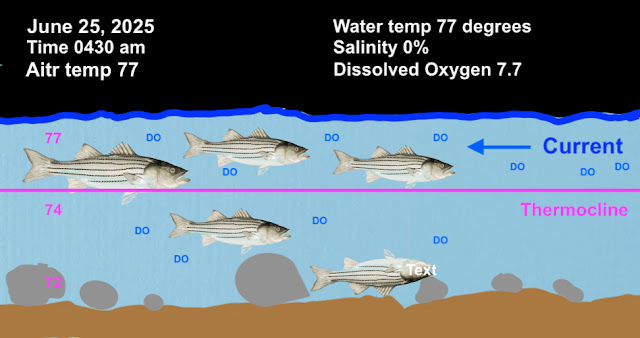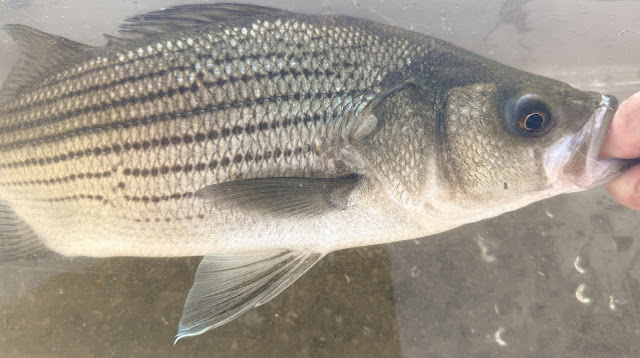Well, as you know we are in an extreme heat wave. It looks like it will break in the next day or two. Yesterday while driving home from Mt. Sinai in Manhattan the car displayed
an outside temp of 109 degrees, and I wouldn't doubt it it if were true. It is brutal. No wind. High heat. High humidity. But luckily powers on in the house and those shitty we-have-an-old-house-so-we-have-window-units sticking out of the windows work. I don't care, at least I can breathe.
Now what about fishing, and striped bass, and the heat? Well, I see my buddy Bruce, who is a sick fishermen, in time spent on the water in all weather, and it body counts, was
out there getting it done, yet again. And he found bigger fish in the low 30's, mostly fishing the faster water where the bass like to stage for food and comfort. But then I thought, what's really going on down inside the water, and why aren't these fish miserable and not eating like I am in the heat?
So when I got home around 6 pm I took the heat gun out (Thanks Dad) and went to check the river and a tributary that runs in. I scoped temps from 77 - 83 degrees. Of course it's high it's
like Sahara-like temps going on. But Bruce is finding fish that are eating, and eating good. Yes, this river has its share of I'm-not-leaving-yet-bass, but some of these are drop backs and are definitely heading out front to the ocean.
While collecting some data I see who is out there fishing and what they're using for set-ups to ethically fish. It's a Yo-Yo hand reel, which is exactly just that, a whip it around and lasso style of fishing. This comes rigged with 40 lb. mono and a 2/0 hook. That's great but guys you should be using circle hooks.
I did some research using internet searches, John Field's book, Fly Fishing for Trophy Striped Bass, the ASGA website, and The Coastal Angler website. What I was looking for was information on how temperature, and at what degrees, do striped bass really get stressed with increased mortality. I'm not going to regurgitate it all here but here's what I found out, or re-found out. The big things are salinity, temperature (water and air), and dissolved oxygen, or DO. I learned that saltwater heats up faster then freshwater and freshwater holds more DO.
The big place we hear about this is the Chesapeake Bay, home of the largest natal system for striped bass. As many as fish migrate, many stay put, even the big ones. Maryland is considering making some adjustments to their seasons, shutting it down in the summer, and opening it more in the spring, to help reduce catch and release mortality.
Now my fish in the Delaware are let's say 50 miles from the ebb and flowing salt line. So it's all freshwater. They spawn in it, spend their nursery time in it, and let's say through kindergarten before moving up to first grade, aka, making the migration move. In the meantime they move with the water, when the river drops, when the tides ebb and flow, where the bait is, and when it's too hot or too cold.
So when I reflected on my 66 degree threshold to fish or not, I thought, am I too low there? And, is it okay to fish in the summer months for these fish? Now obviously it's a scorcher out there now, but what about when things are "normal". So I went looked at the flows, 17,500 and dropping. Thank God for that bump, wherever it came from, that occurred a few days ago. Water temps, 77,
and the dissolved oxygen at 7.7. They, the research says bass, need it to be at least 5, prefer 8-10. Remember when there was almost NO striped bass, shad, or herring above Philadelphia during the 1970's the DO was ZERO. It was dead water back then. Then Philly and the rest of the urban areas smartened up and the river got cleaned up, and the fish returned.
Above we see that this year is running about the same in oxygen saturation percentage as last year, even with this heat wave. There's more DO is faster broken water then in slow moving long stretches, and fresh holds more DO then salt, so we're good there.
Now my question is, "Can I, or should I fish?". If I went during the darkest parts of the day, would the temps be lower, and will the fish be active? And more importantly, will they be able to survive being caught, put into the tank (with frequent water changes), and then released?
So I went at 445 am not knowing what to expect. The water temp was 77.2 degrees, 10 more than my threshold. I'm going to repost that illustration I made up below to explain.
Thermocline- a steep temperature gradient in waters where it's one temp above "a line" and the other below the line. Fields goes into great detail about different lines and what they mean, but for simplicity let's just say there's one line. It can happen in a few feet of water to hundreds of feet deep. Electronics can help anglers find temperature gradient differences which help them locate fish. For me, I'd be fishing in three feet of water or less, but there's still a difference. Currents, seams, and flow direction all have a slightly different temp, DO, and comfort zone for the striped bass. It's a Catch-22 with the water temps and the DO though, up in the water column the water is warmer, but that's where the best DO is, and lower in the column it's cooler, but has less DO. Pick your poison I guess striped bass.
So I started fishing and quickly found fish. They were in 2 feet of water and ready to eat before the sun beat down on them. These weren't Bruce sized fish but 20-26 inchers, fine by me.
I concentrated on water with bubbles, thinking maybe there was a few more liters of oxygen blowing past them. They were in the same spots that I usually find them, on the seams,
low and behind the small rocks and in the depressions, and at times up on top cruising the faster water. Some softly ate, others hit it without abandon, and others cartwheeled out of the water. They all got the tank treatment, again, with frequent water changes.
As much as I hate to say it but all of them "Swam away strong". What does it prove? Nothing. Only that striped bass are active, albeit different times of the day, well Bruce proves that wrong, and that you can, if you have or want to, fish responsibly if you do things right.















